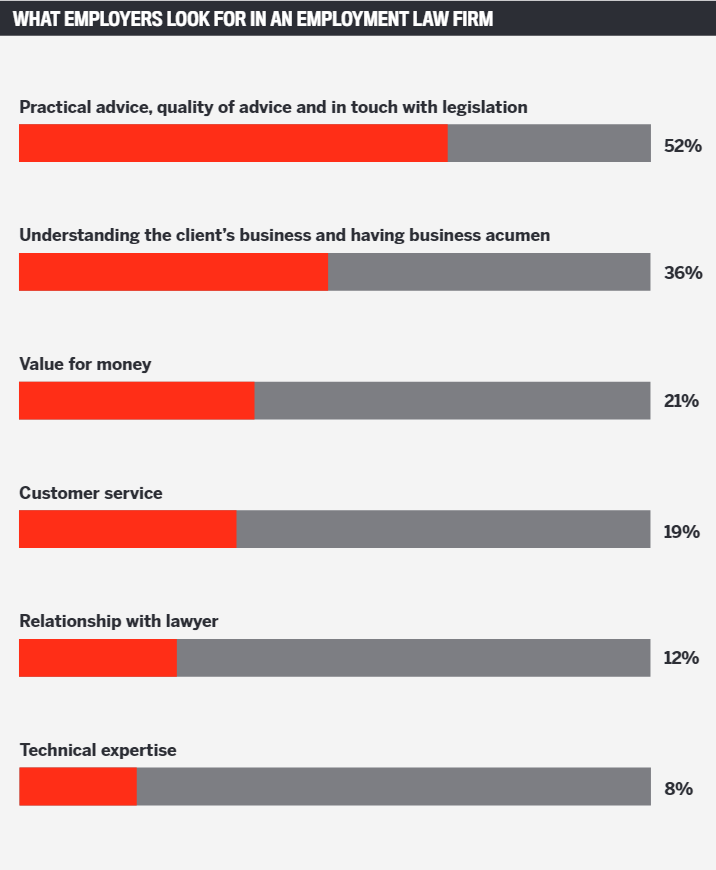

Jump to winners | Jump to methodology | View PDF
As New Zealand's business climate changes in response to the COVID-19 pandemic, the country’s top employment law firms are keeping their fingers on the pulse of organisations that are confronting new workplace challenges. Concerns in the past 12 months have ranged from employee health, safety and wellbeing to corporate restructuring and downsizing.
Navigating the legal complexities of COVID-19
During this period of uncertainty, employment lawyers have regularly and proactively provided commentary on general workplace matters associated with the pandemic, by publishing case studies, explanatory articles and other legal guidance on their official blogs and in third-party online forums and webinars. In fact, all of the law firms included in the research done by HRD New Zealand for this 5-Star Awards report have, in one way or the other, offered free legal advice to the public about COVID-related employment concerns since the start of the global health crisis in March 2020.
This industry-wide practice of publishing expert advice online has been instrumental to helping businesses and their employees navigate the legal complexities of the pandemic. In the process, legal experts helped protect the public against any misinformation about government policies and regulations, particularly its health and safety measures, during and after the lockdown periods of 2020. Apart from government officials and public health experts, employment lawyers have been a trusted source of information for employers, according to more than half of HR leaders (52%) who spoke to HRD.
“Issues such as keeping staff safe when working from home, or when they are at risk of exposure to an illness, should be considered by all employers when reviewing policies”
-John Rooney, partner, Simpson Grierson
Creating safe, healthy and fair workplaces
Companies are relying on legal advice more than ever as they begin to formulate health and safety protocols in light of COVID-19. However, as businesses reopen and employees return to the workplace, employment lawyers John Rooney, partner at Simpson Grierson, and Steph Dyhrberg, partner at Dyhrberg Drayton Employment Law, also point to the wisdom of crowds in understanding the nuances of the employee experience in the new normal. Rooney, for one, urged employers to engage with staff in creating COVID workplace guidelines.
“[Employees] will know what works and what doesn’t, and what they feel puts them at risk. If you engage with staff early in the process, they will feel a sense of ownership over those guidelines and have a proper understanding of why they are there,” he said.
Businesses can learn from how work was carried out during lockdown and put in place new policies to suit. Instead of being concerned about staff coming into work when they may be infectious, firms should encourage staff to work from home, the lawyer advised.
“Employers can take this opportunity to assess the health and safety policies that they currently have in place, and whether those allow them to efficiently deal with a crisis like this in the future. Issues such as keeping staff safe when working from home, or when they are at risk of exposure to an illness, should be considered by all employers when reviewing their health and safety policies,” Rooney said.
Recreating the workplace as a safe space, particularly for women whose careers have been hit harder by the lockdown measures, entails “genuinely listening to employee concerns without judgment, not making assumptions, and taking a collaborative approach to problem-solving”, Dyhrberg said.
“Employers had to be reminded during the lockdown that many parents would be caring for small children or trying to homeschool older children. Expecting full hours and productivity was unrealistic for a lot of women,” she said.
“We still hear managers and boards seemingly at a loss as to how to get the benefit of more women in leadership and in governance roles. Having discussion forums or workshops about how to make the world of work more family-friendly and positive for women would be a great way to identify obstacles to the greater contribution and promotion of women,” she said.
“Due to ... COVID-19, it is likely that a good commercial reason for the need to downsize a workforce will be evident. Where employers fall short is often in the consultation process”
-Andrew Shaw, Lane Neave
Supporting businesses with restructure planning
The COVID-19 economic downturn has also forced businesses to cut back on costs and restructure or downsize their workforces. As a result, employers have had to weigh their options as to which workers are retrenched, redeployed or retained, and provide them with a clear rationale for management decisions. In these instances – especially when a mass layoff becomes inevitable – labour lawyers are called in to balance the interests of the company and the welfare of the workers.
“Employers are under a number of overarching legal obligations, which must be followed to avoid legal issues that might arise but also to ensure that a mass restructure process is both appropriate and humane for those affected employees,” said Andrew Shaw, partner at Lane Neave.
In the past year, employment lawyers have worked to ensure that the retrenchment process has a legal basis.
“The starting point when beginning a conversation about undertaking a restructuring process is to establish that the legal test to justify redundancy will be satisfied – is this an action that a fair and reasonable employer could take in these circumstances,” Shaw told HRD.
Labour lawyers work with employers in examining the possible consequences of restructuring and whether there are alterntives to mass layoffs.
“It is also a legal obligation for an employer to consider appropriate redeployment within the business, which – in the current circumstances – will be difficult given the significant reduction and redundancies in many organisations. Where possible, an employer should also consider alternatives to redundancy, such as a furlough – leave without pay or preference for re-employment,” Shaw said.
“At the moment, due to the impacts of COVID-19, it is likely that a good commercial reason for the need to downsize a workforce will be evident, albeit that this for many employers will be based on forecasting, which can be difficult to get right. Where employers fall short is often in the consultation process,” he said. “To ensure this is being followed correctly, and you act in accordance with your obligations of good faith under Section 4 of the Employment Relations Act 2000, you seek specialist advice.”
Striking new agreements in a downturn
Introducing changes to an employment agreement in the midst of a crisis, however, can leave workers feeling vulnerable. It may even end up straining the relations between the employer, workers, and the unions representing them. “The key as always is good communication but, most importantly, a sound basis for the decision,” says Hamish Kynaston, partner at Buddle Findlay. “Employees and unions want to know why particular roles and those changes; what alternatives have been considered and why they were disregarded. They also want an opportunity to contribute to the solution, beyond responding to a single proposal.”
Employment lawyers play the role of mediator during these complex discussions, and, as Kynaston himself has seen in the past year, employers who “came through the lockdown with their employee and union relationships intact” were often those who consulted these stakeholders about how to respond to the crisis, instead of simply presenting solutions straight away.
“The fact that they began with a more open process had real benefits, and will have real benefits long-term,” he said.
Kynaston cautioned employers against moving forward with changes without understanding the proper legal framework for their actions.
“While there will often be a need to make significant change and quickly, it is as important as ever – if not more so – to ensure any change is implemented lawfully. Practically, employees facing the loss of employment in a depressed job market are more likely to challenge decisions and to succeed if they are unsound, rushed, or poorly explained decisions,” he said.

“Employees facing the loss of employment in a depressed job market are more likely to challenge decisions and to succeed if they are unsound, rushed, or poorly explained”
-Hamish Kynaston, Buddle Findlay
Award insights
HRD New Zealand’s 5-Star Awards for Employment Law Firms recognise the best and brightest in the legal industry that specialise in labour regulations; support employers in the pursuit of a fair, collaborative, healthy and safe workplace; and strive towards the resolution of disputes where they arise regarding HR policies.
The winners exemplify in-depth knowledge of the corporate and legal frameworks that govern organisations, both in the public and private sectors. As New Zealand’s top-performing employment law firms, they demonstrate commitment to advancing their clients’ success by ensuring organisa-tions follow the spirit and letter of the law in a corporate and entrepreneurial setting.
Over the past few months HRD New Zealand’s research team have surveyed and conducted in-depth phone interviews with hundreds of HR professionals and employment lawyers regionwide to compile this list. HR professionals were asked to rate employment law firms and lawyers they had worked with in the past 12 months. In addition, the team sourced recommendations from employers by asking them which firms they would most likely recommend. The law firms and lawyers that are rated highest for the quality of their work, specialist expertise and client service are recognised as winners of the 5-Star Awards.